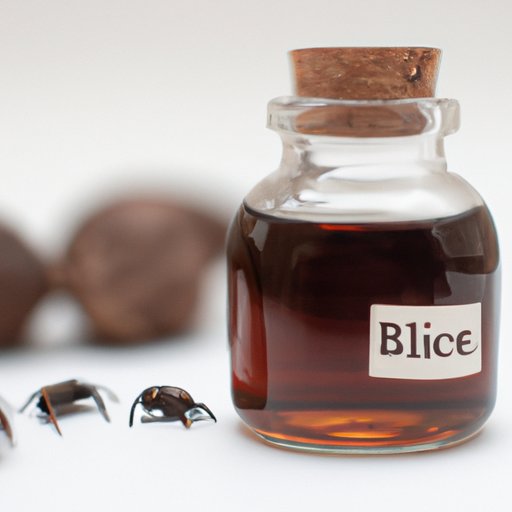
I. Introduction
Bug bites are an inevitable part of life for many of us, and knowing how to get rid of them quickly and effectively is important for our comfort and health. From pesky mosquitoes to stinging bees or ants, bug bites can cause swelling, itchiness, and pain. In this article, we’ll explore various natural and home remedies, offer prevention tips, discuss over-the-counter solutions, suggest natural solutions for kids, and explore lifestyle changes for long-term relief.
II. Natural Remedies for Bug Bites
If you prefer natural remedies, there are several options available to relieve bug bite symptoms. Lavender oil, for example, works as an antiseptic, anti-inflammatory, and as a natural pain reliever. It can take the sting out of bug bites, reduce the itchiness, and prevent infection. To use, apply a few drops directly to the bite or dilute with a carrier oil such as olive oil or coconut oil. Aloe vera gel is also known for its anti-inflammatory properties and can relieve itching and swelling. Rub aloe vera directly onto the bite or use fresh aloe vera leaves. Baking soda is another popular solution for bug bites. Mix baking soda with a small amount of water to form a paste and apply it to the bites. Baking soda helps neutralize the pH of the skin, which can reduce itching and inflammation.
III. Home Remedies for Bug Bites
If you don’t have access to natural remedies, or if you prefer more traditional methods, there are several home remedies that can offer relief from bug bites. Applying ice packs or cold compresses can help reduce swelling and numb the nerves around the bite. Vinegar has antimicrobial properties and can relieve itching and inflammation. Apply undiluted vinegar, or dilute with equal parts water for less irritation. Honey is another natural antiseptic and can reduce inflammation, itching, and redness. Apply a small amount of honey directly onto the bite, or mix equal parts honey and cinnamon powder to form a paste and leave it on for a few minutes before rinsing off.
When applying these remedies, timing is important. For example, use ice packs or cold compresses in the first 24 hours after being bitten. Use vinegar or honey for bites that are at least a day old.
IV. Prevention Tips
Prevention is key to avoiding bug bites. There are several practical tips you can follow to protect yourself from being bitten. Use insect repellent that contains DEET, picaridin, or oil of lemon eucalyptus, especially when going outdoors. Wear long pants and long-sleeved shirts, and tuck your pants into your socks when walking in wooded areas or high grass. Avoid wearing dark-colored clothes or fragrances, as they attract bugs. Keep your windows and doors closed, or use screens to keep bugs out of your home. Avoid going outside during peak bug times, such as dawn and dusk.
V. Over-the Counter Solutions
If natural or home remedies aren’t working, or if the bite is particularly painful or swollen, you may need to try an over-the-counter solution. There are several creams, ointments, and antihistamines available for bug bites, including Calamine lotion, hydrocortisone cream, and Benadryl. Calamine lotion can reduce itchiness and prevent scratching. Hydrocortisone cream can relieve itching and inflammation, but it should not be used for more than seven days. Benadryl or other antihistamines help reduce swelling and itching, but make sure to read the labels carefully and follow dosage instructions.
If the symptoms get worse, or if you develop a fever, rash, or severe swelling, you should seek medical attention immediately.
VI. Natural Solutions for Kids
For children’s bug bites, it’s best to use natural remedies that are safe and effective. Oatmeal paste is a great natural solution that can provide relief from itching and irritation. Mix oatmeal with enough water to form a thick paste and apply it to the bites. Essential oils such as tea tree or chamomile oil can also provide relief. Make sure to dilute the oils with a carrier oil such as coconut or olive oil before applying them on the skin.
VII. Lifestyle Changes for Long-Term Relief
If you want to avoid bug bites altogether, consider making a few lifestyle changes. Changing your diet to include more garlic and Vitamin B1 can help repel bugs. Installing screens on windows and doors, or using natural bug repellents in your garden or home can also help reduce bug populations. Using herbs such as mint, basil, or lavender can also deter bugs. Get rid of standing water and keep your home clean to avoid bug breeding.
VIII. Conclusion
Bug bites can be a frustrating and painful experience, but with the right remedies, prevention tips, and lifestyle changes, you can reduce the symptoms and avoid future bites. Whether you prefer natural or over-the-counter solutions, always make sure to follow the instructions carefully and seek medical attention if needed.





